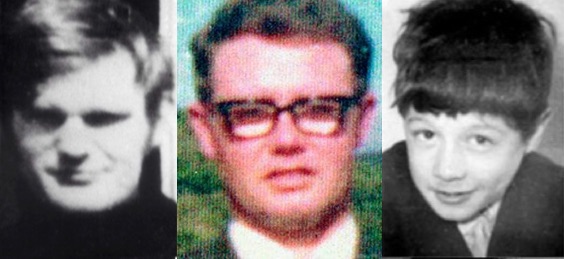
Anger and disbelief have greeted a decision by Crown Prosecutors to summarily collapse cases against those involved in the Bloody Sunday massacre and the Operation Motorman atrocity, both perpetrated by the British Army’s Parachute Regiment in Derry in 1972.
‘Soldier F’, the only soldier to face trial for the Bloody Sunday massacre in which 14 innocent civilans were killed, has had his trial collapse following a “review” by the Crown Prosecution Service.
They have blamed the collapse on a judge’s ruling that certain statements by British soldiers in a separate trial, the killing of Official IRA Volunteer Joe McCann in Belfast, were inadmissible. ‘Soldier F’ was on trial for the murder of Jim Wray (left) and William McKinney (centre).
The prosecution of a former paratrooper ‘Soldier B’ for the murder of 15-year-old Daniel Hegarty (right) in Derry has also been halted on the same basis. Daniel was shot twice in the head during a British Army operation to establish British authority in the nationalist Creggan area of Derry.
A statement from the Bloody Sunday families said they intend to challenge the decision. They noted that ‘Soldier F’ had never contested to the findings of the Bloody Sunday Inquiry, which found him responsible for several shootings.
“He shot dead a 17-year-old boy, Michael Kelly, who presented no threat to anyone. A bullet taken from Michael Kelly’s body was scientifically traced to Soldier F’s rifle,” they said.
“He shot William McKinney and Jim Wray as they ran from Glenfada Park seeking the safety of Abbey Park and wounded four others.
“He shot Paddy Doherty, a 31 years old father of six children from behind, as he crawled to safety in the area of the Rossville Flats.
“As Paddy lay dying, Bernard McGuigan, a 41-years-old father of six went to his aid waving a white handkerchief. Soldier F reacted to this remarkable act of bravery and humanity by shooting Mr McGuigan through the back of his head, the bullet exiting through his eye.”
They added: “Soldier F finds himself in this position today where this prosecution is to be halted, benefitting from an appalling and unlawful agreement which existed between the Chief Constable of the RUC and the General Officer in Command of the British Army which precluded police from interviewing murder suspects under caution.
“Various courts have been scathing of this agreement and the manner in which it offended the rule of law. It is now being relied upon to shield British soldiers from prosecution for the murders of unarmed civilians”.
The decision to halt the prosecutions followed private vows by government officials that no British soldier would ever be allowed to be convicted of a conflict-related murder.
It also follows a new round of talks on the issue of the legacy of the conflict, announced by British Direct Ruler Brandon Lewis earier this week, which are intended to address unimplemented commitments from previous talks agreements.
Sinn Féin’s Michelle O’Neill said it was “a bad day for Justice”.
“The message is clear, British state forces who gunned down peaceful protestors and a child in Derry acted with impunity and will be allowed by the state to get away with murder.”
![[Irish Republican News]](https://republican-news.org/graphics/title_gifs/rn.gif)
![[Irish Republican News]](https://republican-news.org/graphics/title_gifs/harp.gif)

